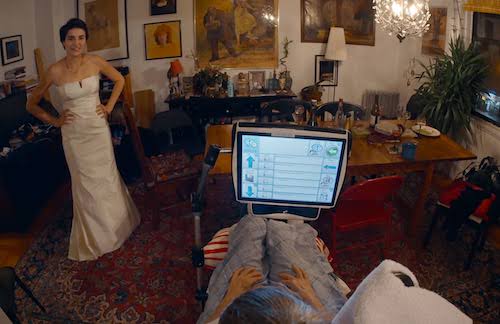Communiqué
Paralyzed by late-stage ALS, Kathryn clings to a mordant wit in “Eat Your Catfish” on POV – July 24 at 10 pm
< < Back to paralyzed-by-late-stage-als-kathryn-clings-to-a-mordant-wit-in-eat-your-catfish-on-pov-july-24-at-10-pm‘POV’ Presents an Intimate View of a Woman Living With ALS and a Family Pushed to Its Tipping Point in the Remarkable Film
“Eat Your Catfish”
Monday, July 24 at 10 pm
POV, America’s longest running non-fiction series, provides a balanced, in-depth look at Kathryn, a woman paralyzed by late-stage ALS in the wryly moving family portrait, Eat Your Catfish. Reliant on round-the-clock care, she clings to a mordant wit while yearning to witness her daughter’s wedding. Narrated by Kathryn and pictured entirely from her point of view, co-directors and producers Adam Isenberg, Senem Tüzen and Noah Amir Arjomand — who is Kathryn’s son — deliver a brutally frank and darkly humorous portrait of a family teetering on the brink, grappling with the daily demands of disability and in-home caregiving.
Eat Your Catfish makes its national broadcast premiere on POV Monday, July 24, 2023 at 10 pm and will be available to stream at pbs.org, and the PBS App until October 22, 2023. In addition to standard closed captioning for the film, POV, in partnership with audio description service DiCapta, provides real time audio interpretations.

With her daughter Minou’s wedding day approaching, Kathryn is determined to live to see her child get married. Years with Amyotrophic Lateral Sclerosis (ALS) aka Lou Gehrig’s Disease, have left Kathryn paralyzed and needing 24-hour care. She relies on an eye-tracking, speech-generating computer to impart her wishes, but it can be an uphill struggle to be ‘heard’. With her mind intact and having opted for mechanical breathing, she could live like this indefinitely. But the destructive manner in which Kathryn’s family is handling the situation further complicates an already strained dynamic. Her husband Saïd feels embittered and alienated, and dedicated nurses and aides are hard to find and keep. Her grown son Noah, who lives with Kathryn and Saïd in their New York City apartment, struggles to balance his academic obligations with those he feels to his mother. Amid all the tension and hardship, Kathryn endures her condition, even as she questions her own decision making.
With both empathy and gallows humor, Eat Your Catfish directors Isenberg, Tüzen and Arjomand draw on 930 hours of footage—all filmed without any crew present, to record Kathryn’s outlook and hopes for the rest of her time on Earth while presenting an unvarnished account of a family’s bond.
“It was an honor and privilege to be able to work with such intimate footage,” said Adam Isenberg, co-director/producer. “I hope viewers who are going through something similar will feel seen, and that this film may open up discussions about what terminal illness and in-home care can do to a family. There is a temptation in these situations to blame others for their shortcomings, but I hope this film will help people see that in such an impossible situation for the terminally ill and their caregivers just getting through a day is commendable. We are imperfect beings and sometimes simply surviving hardship together is an act of love.”

Credit: Noah Amir Arjomand
When asked about telling his family’s story, Noah Amir Arjomand, co-director/producer said: “As a twenty-something caring for my mom and sparring with my dad in a once-grand Harlem apartment, I found it impossible to explain our shared experience to outsiders. I couldn’t articulate the strange mix of claustrophobia, weary perseverance, and bedlam comedy. I turned to the immediacy of film to show rather than tell what it meant for my dad, thrust unprepared into an attendant role; me, lost between love and resentment; and my mom, her rich inner life overtaken by the difficulty of communicating even her basic needs. I hope Eat Your Catfish succeeds in making life with and around ALS relatable and our shortcomings understandable without shying away from hard realities.”
“Although we see and hear Kathryn’s story from her own perspective, we want the viewer to feel they are shifting between each of the family member’s viewpoints in a way that fosters empathy with each of them,” added Senem Tüzen, co-director/producer. “We looked to reveal humorous moments in the everyday flow of life, even in the most painful moments of the strained household. Despite all their troubles, we wanted to ask the fundamental questions: What is the essence of the nuclear family, and why for many of us is it indispensable? Kathryn’s fading health is a starting point to delve into questions about what it means to be human, what and whom we live for, and how we find purpose.”
“What attracted our programming team to Eat Your Catfish, was the rawness of the filmmaking and the style the directors used to convey Kathryn’s experience as a woman paralyzed, but whose mind was 100% intact,” said Chris White, Executive Producer of POV. “Her son Noah’s unspoken and deep-seated intimacy with family members allows viewers to experience the moments of happiness and distress felt by everyone who cares about Kathryn.”

